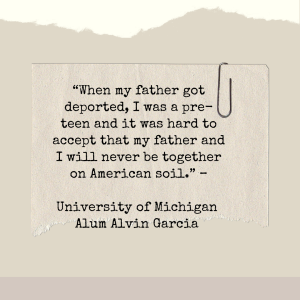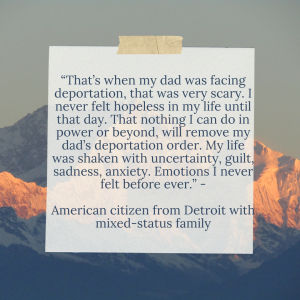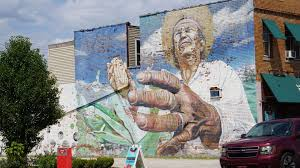The Fight for Undocumented Rights: A Detroit Perspective
 March 18, 2025 – It’s been a while since I last wrote a blog, so allow me to reintroduce myself. My name is Stephen Wallace, and I am the Regional Engagement and Mobilization Associate for Michigan’s Children. I’m from Detroit, Michigan—a city rich with culture and history, divided into three main sections: the westside, the eastside, and southwest. While I was born and raised on the eastside, this blog is about southwest Detroit and communities like it.
March 18, 2025 – It’s been a while since I last wrote a blog, so allow me to reintroduce myself. My name is Stephen Wallace, and I am the Regional Engagement and Mobilization Associate for Michigan’s Children. I’m from Detroit, Michigan—a city rich with culture and history, divided into three main sections: the westside, the eastside, and southwest. While I was born and raised on the eastside, this blog is about southwest Detroit and communities like it.
Southwest Detroit, sometimes called Mexicantown, is a place you instantly recognize the moment you enter. Store signs are in both English and Spanish, and when you walk into a family-owned business, you’re more likely to hear “Hola, ¿cómo estás?” than “Hi, how can I help you?” If you’re lucky enough to be in Detroit on Cinco de Mayo, you’ll witness one of the Midwest’s most vibrant celebrations of Mexican culture. Growing up in Detroit, I wasn’t just aware of the Latino community—I learned from it, built friendships within it, and developed a deep appreciation for its contributions to the city.
In communities like Southwest, it’s common to have friends and neighbors with mixed-status families; some family members are U.S. citizens, for example, the mother and children might be U.S.citizens while the father is undocumented or vice versa. A young man I shared a classroom with at the University of Michigan shared the story of his upbringing in a lecture hall. He said his father, who was at the time incarcerated for marijuana-related charges, was deported. My classmate essentially lost his father as a day-to-day presence in his life, causing terrible stress for him and his mother – who had to raise him by herself.
 This is just one example of the trauma that deportation causes American citizens. Children who are temporarily without a parent due to incarceration already suffer through that traumatic experience, losing a parent permanently only magnifies that, as explained by Alvin.
This is just one example of the trauma that deportation causes American citizens. Children who are temporarily without a parent due to incarceration already suffer through that traumatic experience, losing a parent permanently only magnifies that, as explained by Alvin.
To be clear, mass deportations and family separations didn’t begin with the current administration, but a recent executive order rescinding the “sensitive areas” policy represents a new level of threat to American citizens and undocumented children and their families. The Sensitive Areas protections were first established in 2011 and 2013 by Immigration and Customs Enforcement (ICE) and Customs and Border Protection (CBP), and prohibited immigration enforcement agencies from impeding access to essential services by designating “protected areas,” such as shelters, schools, and hospitals. An executive order ended these protections on January 20, 2025. Michigan’s Children believes having ICE and CBP in hospitals, schools, daycare centers, and schools will hurt children – citizen and non-citizen. No one should have to choose between seeking essential medical care or keeping their family together. No child should fear that their parent won’t be home when they get out of school (like what happened to a family of 5 kids in Trenton recently). No parent should fear their toddler will be traumatized by having armed officers come into their early education classroom.
Other recent legislation, the Laken Riley Act (named after a young woman, Laken Riley, who was murdered by an undocumented individual) also poses a threat to immigrant families. Purported to make Americans safer through detaining undocumented immigrants who are charged with a crime, this bill will allow for the detention of undocumented immigrants based on accusations as minor as shoplifting. It also strips undocumented individuals of basic legal protections like due process and the right to legal representation, according to the Associated Press.
 Over the years, I’ve watched Detroit’s mixed-status families live in fear as policies target their right to stay together in the place where they have built families, careers, businesses and homes. The changes in immigration policy are impacting friends I have known for a long time, going beyond targeting undocumented individuals who might be considered dangerous. I was able to speak with an American citizen directly impacted by the issue These policies don’t just affect individuals—they rip families apart, destabilize communities, and create unnecessary fear in places that should be safe.
Over the years, I’ve watched Detroit’s mixed-status families live in fear as policies target their right to stay together in the place where they have built families, careers, businesses and homes. The changes in immigration policy are impacting friends I have known for a long time, going beyond targeting undocumented individuals who might be considered dangerous. I was able to speak with an American citizen directly impacted by the issue These policies don’t just affect individuals—they rip families apart, destabilize communities, and create unnecessary fear in places that should be safe.
At Michigan’s Children, we refuse to be silent. We will continue educating our communities about their rights when dealing with ICE, amplifying the voices of those most affected, and pushing back against policies that dehumanize immigrant families. Our blogs, podcasts, and advocacy efforts will always center the stories that need to be heard.
If you don’t personally belong to an immigrant community, I encourage you to step outside of your comfort zone. Spend time with people from different backgrounds, listen to their experiences, and challenge the fear-mongering narratives that shape public perception. Sensationalized headlines should not dictate your empathy or the policies you support. If you call yourself an advocate, it is your moral obligation to stand up for those who may not be able to speak for themselves.
Real change happens when we show up—not just in moments of crisis, but consistently, in solidarity.

Resources:
- https://acrobat.adobe.com/id/urn:aaid:sc:US:e6d91a60-7059-4e27-914b-ce54b9086ab4 (Protecting our Students)
- https://acrobat.adobe.com/id/urn:aaid:sc:US:5d64aafe-fa91-4cc1-9231-f1436fbf3d7b (Parenting Program)
- https://acrobat.adobe.com/id/urn:aaid:sc:US:abd798f1-58f3-4b00-bb75-98d3e97f9547 (Safe Schools for Every Student)
- https://acrobat.adobe.com/id/urn:aaid:sc:US:c4987d6b-73bf-4344-aae3-8206573b2bd8 (What Schools Should Know about ICE enforcement actions)
Citations:
- https://apnews.com/article/what-is-laken-riley-act-trump-immigration-2667d626139ddf5a16d1533516eab18f
- https://www.whitehouse.gov/presidential-actions/2025/01/protecting-the-american-people-against-invasion/
